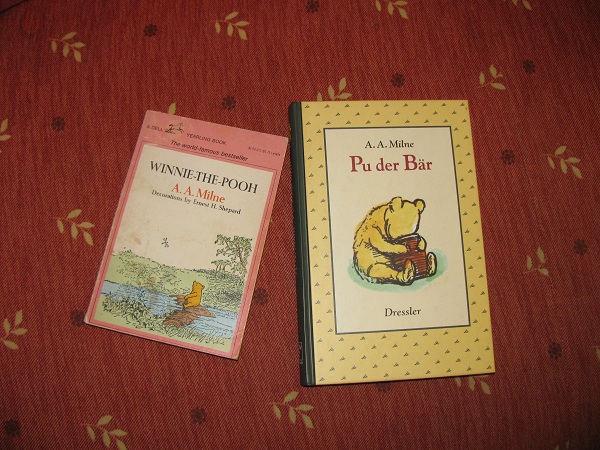It’s time for Sonderling Sunday! That time of the week when I play with language by looking at the German translation of Children’s Books, sort of a Silly Phrasebook for Travelers.
This week, I’m going back to one of my favorite books, Winnie-the-Pooh, by A. A. Milne, otherwise known as Pu der Bär.
Last time we looked at Pu, we finished Chapter 2, about Pooh getting stuck in a very tight place. So this time we will cover Chapter 3, “In Which Pooh and Piglet Go Hunting and Nearly Catch a Woozle” = In welchem Pu und Ferkel auf die Jagd gehen und beinahe ein Wuschel fangen.
Oh! This is my opportunity to see what the translator did with the elaborate joke about Piglet’s Uncle “Trespassers William.”
“TRESPASSERS W” = BETRETEN V
It’s a pretty straight translation, just using a different name.
For research, I used Google Translate to see what “Trespassers will be prosecuted.” would be in German. Google came up with Strafrechtlich verfolgt wird. Maybe “v” is for verfolgt?
“it was short for Trespassers Will”
= es sei die Abkürzung von Betreten Vic
“which was short of Trespassers William”
= welches die Abkürzung von Betreten Victor sei.
“And his grandfather had had two names in case he lost one”
= Und sein Großvater habe zwei Namen gehabt, für den Fall, dass er mal einen verlöre
“Trespassers after an uncle, and William after Trespassers.”
= Betreten nach einem Onkel und Victor nach Betreten.
“carelessly” = leichtsinnig
A good phrase to know:
“Well, there you are, that proves it.”
= Siehst du, das beweist es ja.
“Pooh was walking round and round in a circle”
= Pu ging immer im Kreis herum
“tracking” = spüre
This is straightforward, but I like it:
“That’s just what I ask myself. I ask myself, What?”
= Genau das frage ich mich auch. Ich frage mich: Was?
“What do you think you’ll answer?”
Und was, glaubst du, wirst du dir antworten?
“paw-marks” = Pfotenabdrücke
“He gave a little squeak of excitement.”
= Es quiekte leicht vor Aufregung.
This is classic Pooh. Not quite the same in German:
“‘It may be,’ said Pooh. ‘Sometimes it is, and sometimes it isn’t. You never can tell with paw-marks.'”
= »Könnte sein«, sagte Pu. »Manchmal ist es das und manchmal ist es das nicht. Bei Pfotenabdrücken kann man nie wissen.«
“was bending over the tracks in a puzzled sort of way”
= beugte sich verblüfft über die Spuren
(“bent himself perplexedly over the tracks”)
“Hostile Animals” = feindselige Tiere
(The translator did not retain the Meaningful Use of Capital Letters.)
“a small spinney of larch trees”
= ein kleines Dickicht aus Lärchenbäumen
(Ah! Now I can find out what a “spinney” is! Dickicht = “thicket.”)
“what his grandfather Trespassers W had done to Remove Stiffness after Tracking”
= was sein Großvater Betreten V gegen Steifheit in den Gliedern nach der Spurensuche unternommen hatte
“Shortness of Breath”
= Kurzatmigkeit
Again, classic Pooh:
“It is either Two Woozles and one, as it might be, Wizzle, or Two, as it might be, Wizzles and one, if so it is, Woozle.”
= Es sind entweder zwei Wuschel und ein, falls es das ist, Wischel oder zwei, falls sie das sind, Wischel und ein, falls es das ist, Wuschel.
“Hostile Intent” = feindselig Absichten
“muddled” = vermengten
“The tracks of four sets of paws”
= die Spuren von vier Pfotenpaaren
“it brought very little comfort”
= dies wenig Trost brachte
Just in case you need to say this:
“I have just remembered something that I forgot to do yesterday and shan’t be able to do tomorrow.”
= Mir ist etwas eingefallen, was ich gestern zu tun vergessen habe und was ich morgen nicht tun kann.
“dear old Pooh” = liebster, bester Pu
“Silly old Bear” = Dummer alter Bär
“I see now.” = Jetzt verstehe ich.
“I have been Foolish and Deluded.”
= Ich war ein verblendeter Narr.
(“I was a deluded fool.”)
This doesn’t have the same ring to it:
“I am a Bear of No Brain at All.”
= Ich bin ein Bär ohne jeden Verstand.
(“I am a bear without any understanding.”)
“You’re the Best Bear in All the World.”
= Du bist der beste Bär der ganzen Welt.
“And then he brightened up suddenly.”
= Und dann erhellte sich plötzlich seine Miene.
Perhaps the most useful phrase of all:
“Anyhow, it is nearly Luncheon Time.”
= Auf jeden Fall, ist es schon fast Zeit zum Mittagessen.
Auf jeden Fall, ist es schon fast Mitternacht. Gute Nacht! Till next time!

Betreten v. is short for “Betreten verboten”
What means “forbidden to enter”
And in English, It’s Trespassers Will, short for Trespassers Will Be Prosecuted. So they were going for the same idea.